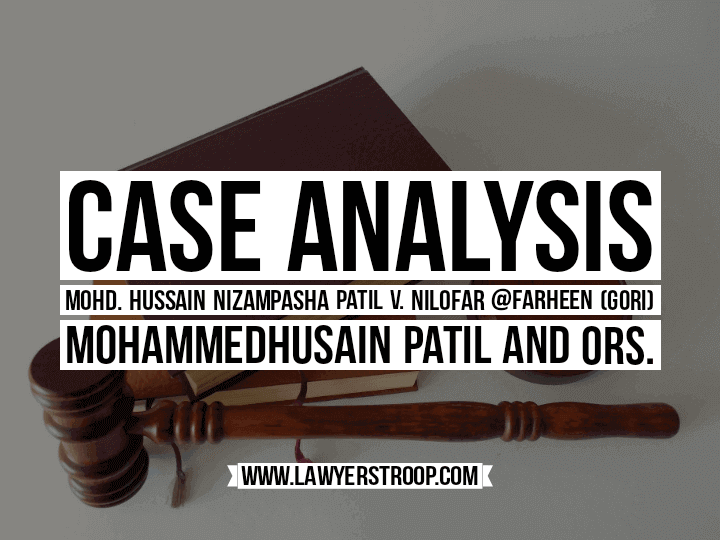This Case Analysis is written by Tasneem Hussain Legal content writer at Lawyers Troop

- Writ Petition No. 6101 OF 2018
- In the High Court of Judicature at Bombay
- Bench: Akil Kureshi, J., S. J. Kathawalla, JJ.
- Decided On: August 8, 2019
Title
Article 14 of the Constitution of India prohibits class legislation but not reasonable classification.
Relevant Statutes and Sections
- Constitution of India, Article 14, Article 15, Article 20, Article 21, Article 39, Article 226
- Code of Criminal Procedure, 1973, Section 125
- The Hindu Marriage Act, 1955, Section 24
- The Domestic Violence Act, 2005, Section 12
- The Indian Penal Code, 1860, Section 498A
Facts and Procedural History
- The petitioner and respondents were a couple married under Islamic laws. Soon after their marriage, disputes arose between them. The respondent was unemployed.
- The respondent (wife) filed a suit for maintenance under Section 125 of Code of Criminal Procedure, 1973, for herself and her son before the Family Court of Solapur.
- The Family Court directed the petitioner to pay maintenance to the respondent and her son.
- The petitioner filed an appeal in the High Court which was dismissed.
- The petitioner then filed a petition before the High Court of Judicature at Bombay challenging the constitutional validity of Section 125 of Code of Criminal Procedure, 1973. He also, through his petition seeks the court to formulate guidelines for granting maintenance under various provisions of the Indian law.
Issue Presented
Whether Section 125 of Code of Criminal Procedure, 1973 is in violation of Article 15 of the Constitution of India?
Ratio of the High Court
The petitioner claims that Section 125 of the Code of Criminal Procedure is violative of Article 14 of the Constitution of India as it only provides for maintenance to women. He claims that under Article 14, Equality is granted without any discrimination on the basis of gender. It is also violative of Article 15 of the Constitution of India.
The Court looked into Section 125 of Code of Criminal Procedure, 1973, and observed that Section 125 is a special provision for four classes of people namely wife, minor child, major child with physical or mental abnormality and father or mother. Also, the Court has highlighted the use of the words “unable to maintain” in Section 125. This implies that maintenance shall only be granted to these four classes of people in case where they are unable to maintain themselves.
The court laid reliance on the judgement of Chaturbhuj v. Sita Bai1, wherein the Supreme Court clarifies the objection of Section 125 of Code of Criminal Procedure, 1973, saying that the objective of this section is to prevent destitution of people who are unable to support themselves by the means of compelling those who are capable to provide such assistance. This Section is a welfare provision meant for social justice as held by the Supreme Court in the case of Captain Ramesh Chander Kaushal v. Veena Kaushal2.
This Section falls under the ambit of Article 15(3) and Article 39 of the Constitution of India. The maintenance is for the basic amenities of life such as food, clothing and shelter as held in Savitaben Somabhai Bhatiya v. State of Gujarat3. The court also pointed out that in the case where the wife is maintaining herself by begging, it shall not mean that she is able to maintain herself and will be entitled to maintenance. The claim should be enough for a person to maintain a standard of living consistent with the status of the family as held in Bhagwan Dutt v. Kamla Devi4.
In the case of Shabana Bano v. Imran Khan5, the court held that Muslim women are also entitled to maintenance under Section 125 of the Code of Criminal Procedure, 1973.
The Supreme Court commented on the constitutionality of Section 125 of the Code of Criminal Procedure, 1973 in the case of Danial Latif v. Union of India6 where it was held that this section is constitutional as the object of this provision is to compel those who can provide help to those who are unable to maintain themselves in order to avoid destitution.
The Court held that Article 14 of the Constitution of India prohibits class legislation but not reasonable classification.
Decision Held
The Court dismissed the petition. It held that the Section 125 of Code of Criminal Procedure is constitutional. It also held that neither the Union of India nor the State of Maharashtra has the authority to formulate guidelines to govern the judicial discretion of the competent courts in matters of maintenance. Considering the above deliberation, the Court dismissed the petition.


0 Comments